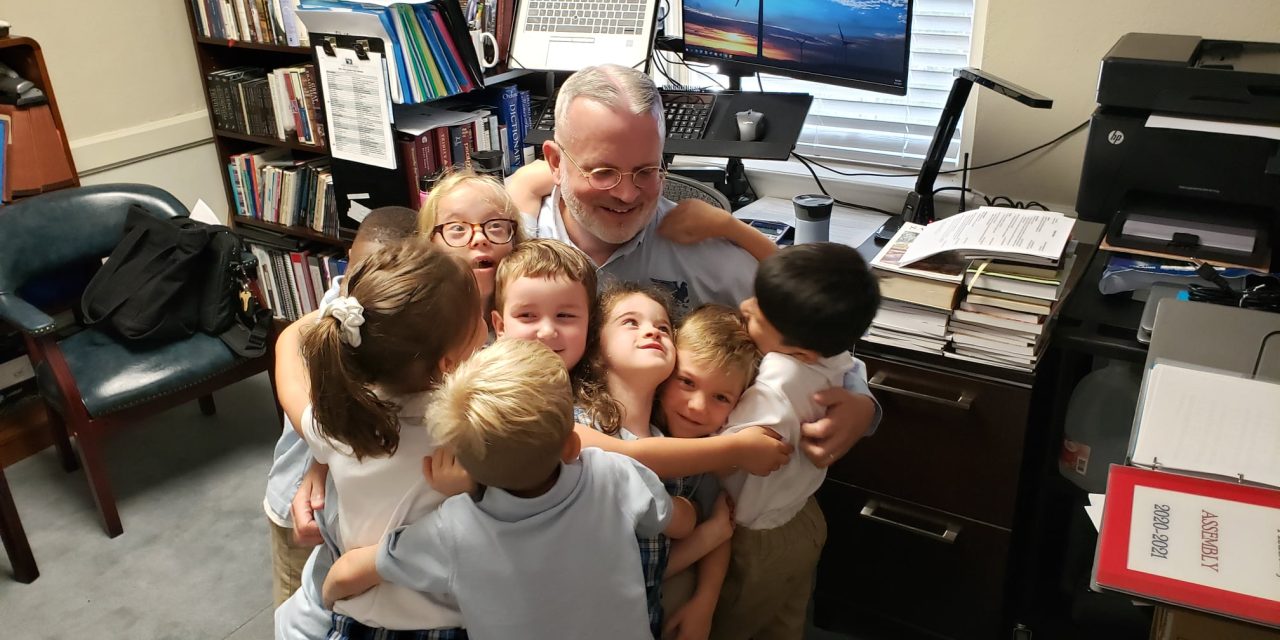By Kajsa Wilkins*
Thoughts on “Shepherding a Child’s Heart”
When our children were just 6 and 8 years old, my husband and I moved to New York to pursue his singing career in opera and music theater. Within our first few days of living there, one of our kids’ favorite pastimes quickly became riding the subway. Now, if you have ever been on the New York City subway, you might be surprised by this. But they loved to look out the window, into the dark tunnel, to see the magical world that was underneath the city. On one of these occasions, I noticed my son was pushing his mouth and eyebrows upwards into a strange sort of a clown/muppet smile. He did this over and over, looking at his reflection in the window. Finally I asked him what and why he was doing this. He replied, “I’m making my face joyful, Mom!” At this I both laughed and inwardly cringed.
Shortly before getting on the subway that day, I had scolded him for his attitude during school. He had been pouting and cranky, and his teacher had mentioned it to me. I told him how he needed to be joyful—how his face needed to be joyful. As the son of performers, he took this literally—and was practicing. Only I had not shown him the right and true meaning of joy—which can only come from the Lord. I had shown him that what matters is the outside of the cup. The inside could be as dirty as we please, but the outside needed to be shiny and clean.
In Matthew 15, Jesus addresses the Pharisees by saying: “You hypocrites! Well did Isaiah prophesy of you, when he said: ‘This people honors me with their lips, but their heart is far from me.’ ” Jesus calls the Pharisees out for this same “outside of the cup” issue—they worship with their lips, but not their heart. We as parents seek “good behavior” with no concern for the heart and the driving force behind that behavior. But God calls us and has placed us in our children’s lives as parents—and that means we have to do the hard work of, well, parenting.
In the book, Shepherding a Child’s Heart, written by well-known author, Tedd Tripp, the heart is described as the control center of our lives. But what controls our hearts? More importantly, what controls our children’s hearts? These are questions we, as parents, should always be asking. But getting to the answers requires asking more questions.
Who is influencing your children outside the home?
I love dancing, and would watch dancing shows with my kids. One day I heard thumping and crashing coming from their bedroom. When I opened the door, to my surprise, I found my 9-year-old son, with his sister atop his shoulders ready to do a complicated flip move they had just witnessed on the show a few minutes before. Thankfully I was able to intervene before the ER, but you get the idea. Life influences.
Your children are at school typically more hours in a day than they are at home. So who is influencing them? There is a reason you have chosen a Christ-centered educational environment – because you hope to have people influencing them that have Christ as their center. But what sports are they involved in? Who are their coaches? What about the neighborhood children? What about the shows they watch? The video games they play? YouTube? Social Media? All of these play a role in shaping your child’s “life experiences.” You need to be aware of what is poured into your child, and in turn, what is pouring out.
How are your children being influenced inside your home?
Children react to life experiences, as Tripp says, “according to the Godward orientation of his heart.” It is easy to look at the foremost influences: you. What is your family life like? Who is around your children the most? How many children do you have? What routines and liturgies do you as a family have? What matters most in your home and is that clear to your kids? And most importantly, where does God rank amongst all of this? Is He on a shelf somewhere in a back hall closet? Or is He the center, the priority, and the compass?
Let me insert an important reminder here: just because children are in a Christian school—classical or otherwise—does not mean that their path is set, and they will become “good people.” They are children of God, and it is their faith and focus on Him that determines their path. As it says in Proverbs 3:5-6, “Trust in the Lord with all your heart and lean not on your own understanding. In all your ways acknowledge Him, and He will make straight your paths.”
Are you remembering the power of prayer?
Children may not be fully aware of why or what it is they worship exactly, but they are not neutral. As Tripp’s book reminds us, all children are made in God’s image and “are designed with a worship orientation…. they are not simply the sum total of what you and I put into them, they interact with life either out of a true covenant of faith or out of an idolatrous covenant of unbelief.” Our children are doing one of two things: they are either growing and learning how to live their life according to their wants, desires and understandings, or they are learning to orient and point towards God and who He has made them to be—and in so doing, following the path He has made for them. Their happiness and freedom comes in serving Him—not their wishes, or who they think they should be.
As parents, we must be in constant prayer that God will keep their steps close to Him—that they will be faithful servants and live a life according to the Gospel. In praying for them in this way, you are trusting God to keep His covenant promises. ✤
Kajsa Wilkins is Dean of the North Campus at The Ambrose School in Meridian, ID.
This article is sponsored by our Corporate Partner, ClassReach.










